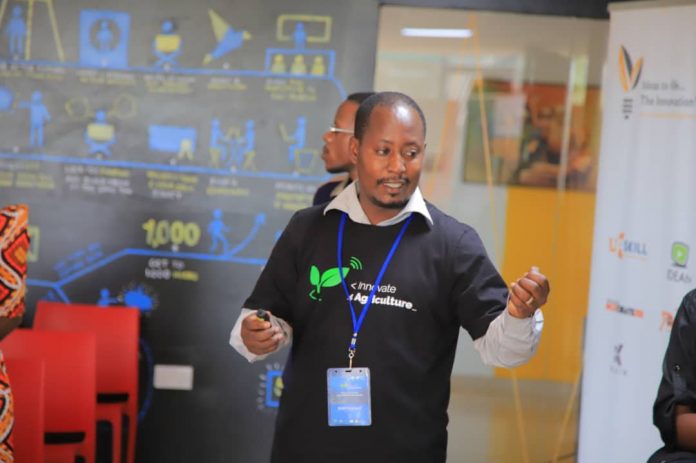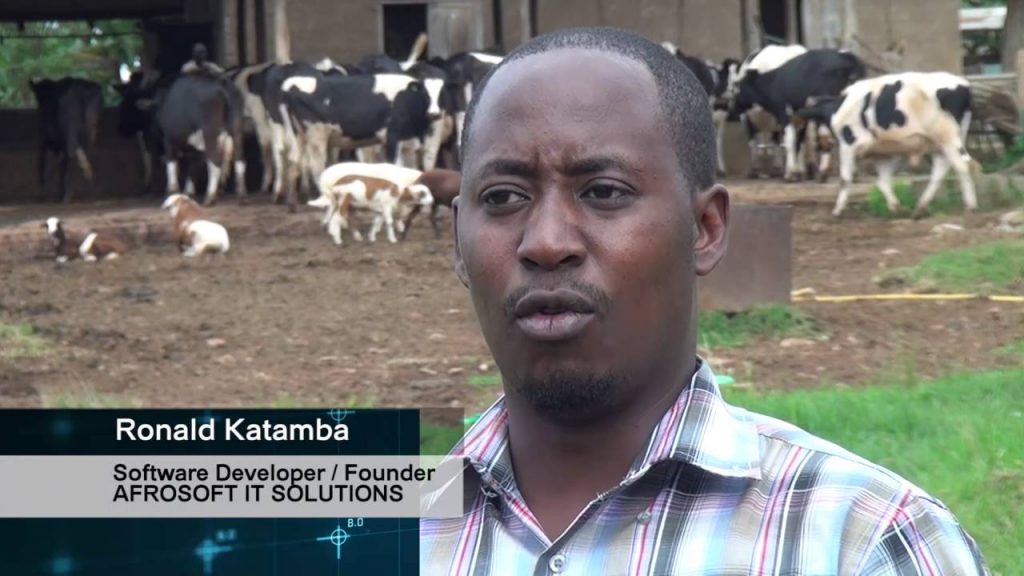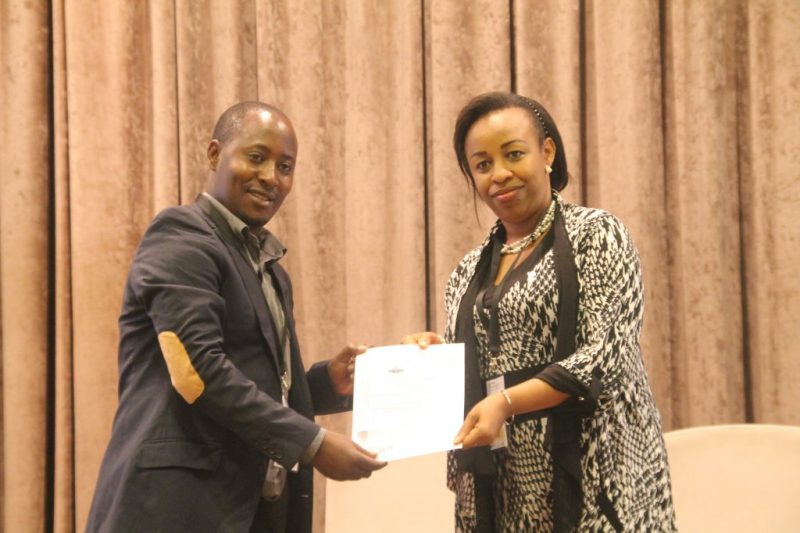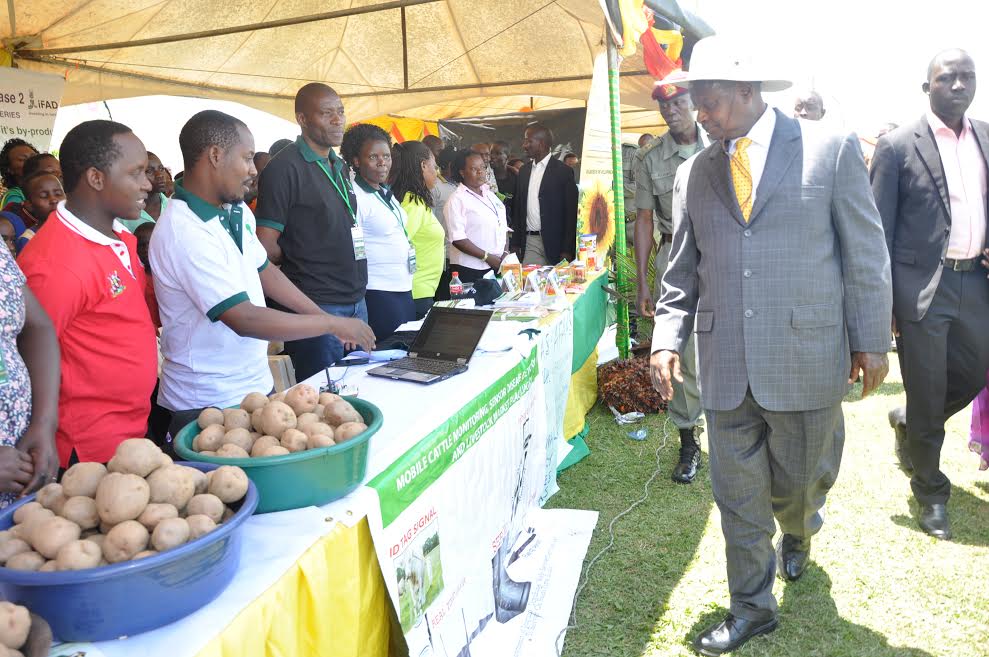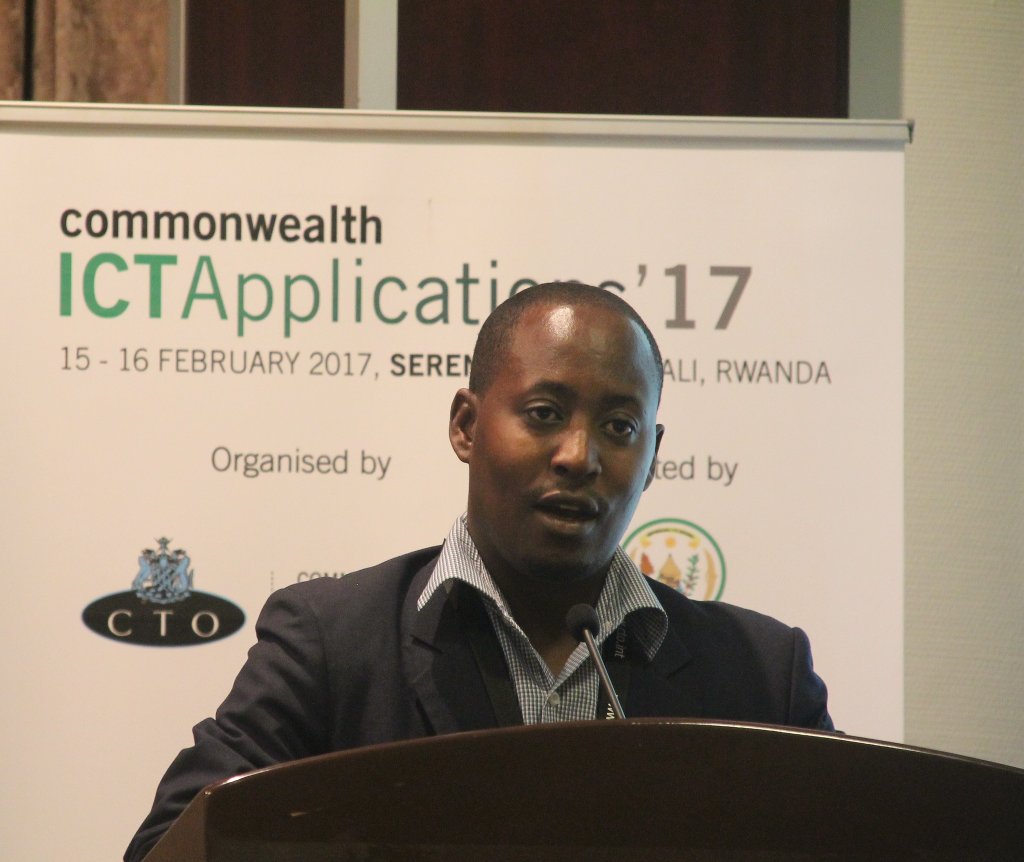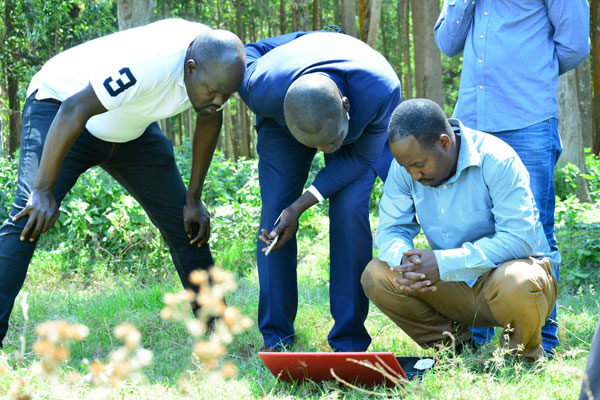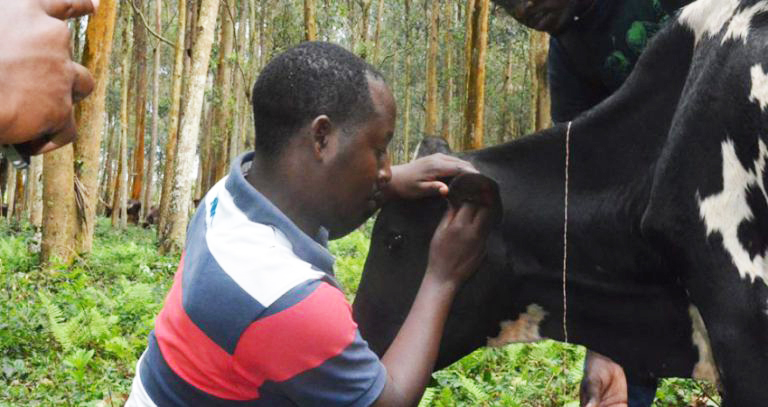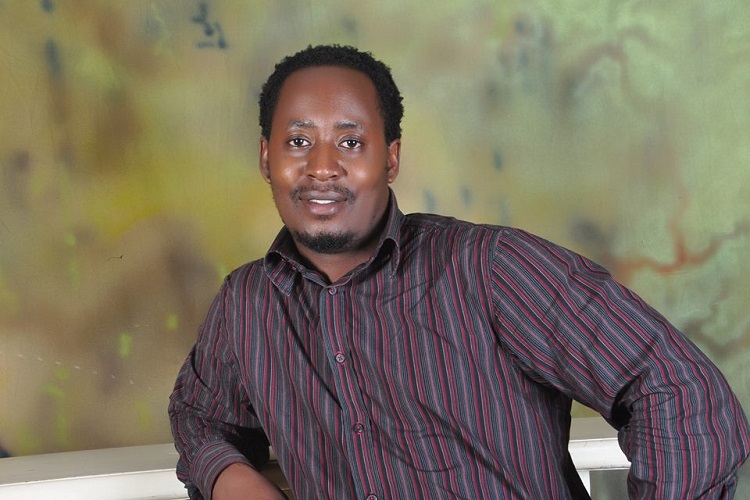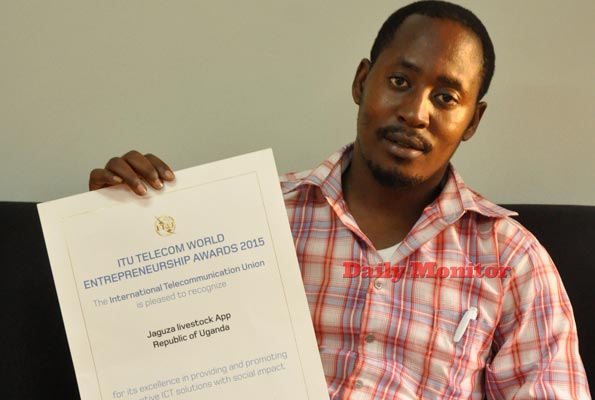Jaguza Livestock App Selected For The Second Cohort of NIISP
Following the call for ICT innovation proposals earlier this year, 100 innovators have now been selected to take part in the second cohort of the National ICT Initiatives Support Programme (NIISP).
NIISP a body under the Ministry of ICT and National Guidance (MoICT&NG), aims to create a sustainable ecosystem for ICT Innovations and support ICT innovators and developers at large.
MoICT&NG allocated funds to NIISP to support the program.
In the second cohort search, 665 applications were received and were evaluated by a Committee of experts appointed by Hon. Frank Tumwebaze — hence selecting out the 100 finalists.
Priority sectors were; Education, Health, Agriculture, and Public Sector Management (PSM). Health led with 21 finalists, followed by PSM with 19, Agriculture (18), Education (17), and others (25).
The finalists will from April 16th to 18th pitch their products/services to the Committee where selected winners will benefit from the fund.
In a press statement released by MoICT&NG didn’t mention how many applicants will benefit from the fund. However, they did mention that those that won’t be directly supported will be availed working space at the various ICT innovation hubs.
Jaguza Livestock App For Monitor and Detection Diseases in Animals
Afrosoft Innovator Stun ICT Ministry Permanent Secretary
The Parmanent Secretary of the Ministry of Information and Communications Technology (ICT), Vincent Waiswa Bagiire has expressed his amazement at the innovations being hatched by Afrosoft IT Solutions, approved a Kampala based innovations hub.
Bagiire was Friday paying a courtesy visit to Ronald Katamba, the Afrosoft proprietor at their offices at Teachers’ House in Kampala.
Afrosoft is a software Development company delivering value proposition through quality process and people. Over time, the company had evolved to become an incubation hub for ICT innovators and training ground for ICT scholars.
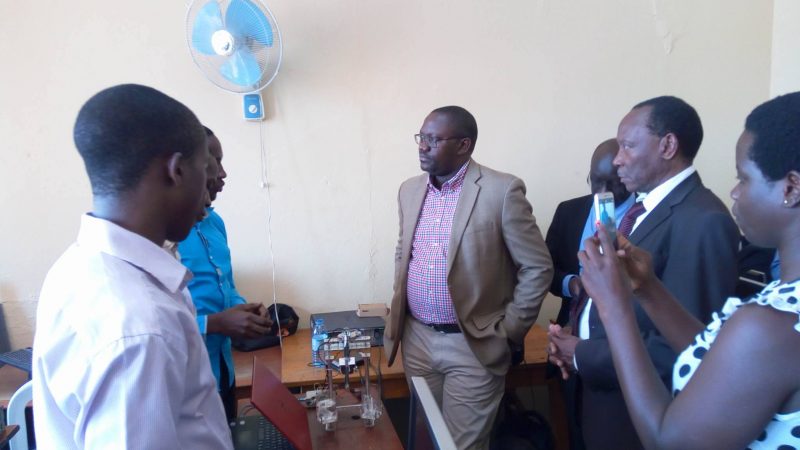
<strong>Some of the innovators pitching their innovations as Bagiire and other MoICT officials look on.</strong>
During his visit, the Permanent Secretary got an opportunity to interact with various innovators who were at the office, many of them explaining and pitching their innovations.
Notable among the projects being run at Afrosoft hub is an automated Antenatal care system (Mama), an electronic payment system (Rainbow) and the famous, award winning Jaguza Livestock app among others.
Katamba took time to explain the genesis, inspiration behind the Jaguza app and the projected impact the app could have on the livestock industry in the country.
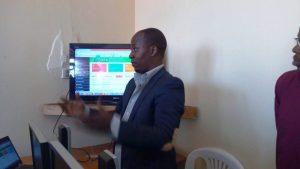
<strong>Ronald Katamba explaining the mode of operation of Jaguza Livestock app</strong>
Currently, the app is being used by farmers in two districts in Uganda and has received a number of local and international excellence awards.
“We want to support innovators but they should be organized, that’s why we need a thorough process analysis before one starts to do anything,” said Bagiire.
“For one to develop a solution, they need to identify a particular problem in society such that their apps are demand driven,” he added.
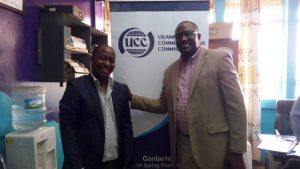
<strong>UCC is one of the Agencies partnering with Afrosoft to groom innovators</strong>
Bagiire revealed that the ministry harbors plans to support and finance innovators through the innovation fund advising that caution needs to be taken to ensure the funds are put to good use.
“We want to give people this innovation fund but we need to know they are on good truck. Some people might have good innovations but they get messed along the way and that’s what we want to avoid.”
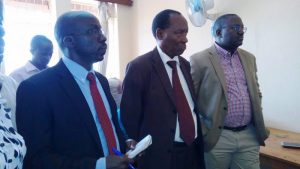
<strong>MoICT officials watch as Afrosoft innovators pitch their innovations</strong>
Livestock Farmers To Access Jaguza App
Jaguza livestock App award winners Ronald Katamba reveals plans t sensitize farmers across the country about how his app works. The countrywide drive is intended to help farmers detect diseases in their livestock before they manifest.
How Ronald Katamba’s Award-winning App Will Transform Uganda’s Livestock Farming
With the world’s youngest population, widespread use of mobile phones, and the increasingly easy access to internet services, Ugandans have embraced Information and Communication Technology (ICT) innovations.
This, can be witnessed from the number of web and mobile applications with working prototypes that have been developed by young innovators in the country, all in a bid to solve problems that the country is facing and others to better the standards of living.
The challenge however, lies in the sustainability of the products, given the fact that the process of development requires monetary funding, vision and objectives for why the apps are developed, the impact that the app will have to the community among others.
These and many others altogether have caused some of the ‘would be’ exciting apps to not see the light of the day.
The Uganda Communications Commission (UCC) has played a pivotal role in giving many young innovators in the country a chance to showcase their products through their annual Acia awards and this has helped a number of them to gain global recognition.
One of the innovators, Ronald Katamba (the developer of the ‘Jaguza’ Livestock App) has contested on the international level, winning different awards especially in the categories of Agriculture and entrepreneurship.
The most recent award that Katamba’s ‘Jaguza’ Livestock App has scooped was at the Common Wealth Youth ICT competition, where it emerged as the best in the e-Agriculture category.
ChimpReports ’ Paul Mugume caught up with Katamba at his office located at Teachers’ House, Bombo Road in Uganda’s capital Kampala to establish where he got the inspiration to build Jaguza, and his future prospects of the app.
Katamba runs an IT company, AfroSoft, which deals in web and mobile app development, mentoring young innovators, training interns among many other activities.
He says he was introduced to coding while in Senior three, by his uncle, Mwesigwa Ssemambo who at the time was an IT consultant and a programmer.
“I started learning how to code while I was in senior three, at DLK Muwonge Senior Secondary School in Kayunga.”
“My uncle gave me books about programming in C. As I was reading, I would keep writing some simple code and that’s how I managed to master it,” he said adding that “Right now, I can even author a book about the C programming language.”
Katamba, due to his love for computing and the knowledge that he had in the field, was hired to teach computing to the Entebbe Municipal Council employees during his Senior six Vacation in 2006, from where he joined Makerere University to study a bachelor’s degree in Information Technology.
“I had good knowledge of programming by the time I joined campus, all I needed was to have it certified and maybe add more to what I already knew; that’s why I chose to do IT at campus.”
“I was happy when I was introduced to C programming language; I had to make sure that I master it since it’s the basis of all programming.”
Developing Apps
Katamba says he started developing apps in year one at campus after he was introduced to programming in C.
“In my first year, first semester, after being introduced to C; that’s when I started making apps. My first application was a loan management system and I made it using C.”
“By then, I didn’t have a personal laptop so I used to spend a lot of time in the computer lab for practice and coding. I made my first app from the computer lab.”
“During my second semester, we got a call from Microsoft. We applied and went to Nairobi where we presented a project about Land use and Carbondioxide mission.”
“We managed to beat 16 African countries and represented East and Southern Africa in the finals in France.”
Building Jaguza Livestock App
Katamba says he started building the app in 2014 and was inspired by memories of the catastrophe that hit his farm while he was in senior one.
“When my parents died in 1996, I couldn’t afford school fees to go to school. I resorted to rabbit farming to raise money for my school fees and in a way, the business worked well because I had over 30 rabbits on the farm.”
“There is that fateful day when I woke up, and found out that all my rabbits were dead. I was left with no option and had to miss school for a full term.”
“That is exactly what inspired me to build the app because I know there is someone out there who is like me, and they need help,” he explained.
He says he first designed ‘Lunda’, a mobile app that helps to follow up the gestation period and insemination of livestock but after he attended a UN Youth Innovation Hangout, he thought of making an app to detect disease in animals.
“I presented Jaguza at Acia awards where I was encouraged by positive reactions from farmers and the judges selected it in the best project category,’ he said.
“After that, the UN Resident coordinator Ahunna Eziakonwa liked the app and advised me to present it at the ITU Telecom World awards where I was recognized.”
How the app works
Jaguza Livestock App is a system used to monitor and diagnose early stages of diseases in animals, using sensor technology, and locate the whereabouts of animals in a given area using GPS systems.
Each time an animal moves out of range, a notification is sent to a solar powered receiver (spr) from the device. The spr sends this information to a cloud server which in turn sends information to your computer or mobile phone.
“Initially, ‘Jaguza’ and ‘Lunda’ used to be different apps but we combined them to make one app that can perform all the functions,” said Katamba.
The app can be used online and offline. While online, the notifications are received via the app although there is an SMS option for offline users.
This, Katamba says, will help extend Jaguza services to even the people at the grassroot who don’t have access to internet.
As part of the new developments, a team of Veterinary Doctors has also been put in place to offer treatment and consultancy services through the app via sms so as to enable a farmer access all the medical attention he needs for his livestock.
Awards and Recognition
- The App was recognized at the ITU Telcom World Entrepreneurship Award 2015 as the best entrepreneurship project of the year.
- Named among Best Nine Agriculture Projects in Africa 2015 by CTA Africa.
- Named among best 20 projects in East Africa by Ashoka Change Maker
- Recognised as the best e-agriculture for young ICT Innovation at the Common Wealth Telecommunication Awards, an award he is set to receive at the CTO Forum scheduled for September 12 to16, 2016 in Nadi, Fiji.
Challenges
Katamba says that the biggest challenge he faces are the people who want to steal and replicate his work.
“This app is not on google play store because there are those people who don’t want to think. They just want to find your work and plagiarize it,” he said.
He said that some of his other projects have already been duplicated and so he is worried they may want to duplicate Jaguza too.
“At some places where we have presented, you see someone recording; when you ask them why they are recording, they tell you they are going to present it to their boss but before you realize, they have duplicated your work.”
Jaguza Livestock
Jaguza livestock App aims at helping farmers in detecting the early stages of diseases in animals today, and theft of livestock and domestic or farm reared animals. It is a system used to monitor and diagnose the early stages of diseases in animals using sensor technology and locate the whereabouts of animals using RFID Chips, GIS ,SMS Pincode Web App and GPS mapping algorithms to locate the whereabouts of the animals in a given geographical area. Jaguza’s aim is to establish national wide network for detecting animal diseases and handling the dangerous outbreaks of diseases. The system uses sensor technology to detect the early viral phase of FMD for example which is crucial before the disease becomes more contagious.
Uses leg or neck tags for accurate movement and mobility monitoring. Neck tags also monitor eating time, identifying sick cows sooner. Reports can provide information by individual cow, group or herd. Signal sent to the receiver using a long range antenna/Bluetooth Disease events database. Under the Disease Events tab, Jaguza enables users to easy access and retrieves information on animal disease outbreaks/cases throughout the world according to user search criteria (disease, date, species, location, etc).
Data can then be easily exported into two available formats (PDF and Excel) for further analysis. Mapping. The mapping tools allow to select outbreaks/cases from the database and represent them graphically as charts (by time or by location in the real time) or geographically on a map that can be tailored by adding optional layers, such as livestock population, biophysical layers, socioeconomics, animal health, trade. Resource Centre/Disease Centre. This section allows to search for technical material such as bulletins, reports, newsletters, manuals, guidelines, etc. , according to different criteria. It allows users to search information related to the current situation, epidemiology, diagnoses and control.
Ugandan Innovator Katamba Woos Investors at CTO Apps Forum in Rwanda
Award winning young innovator Ronald Katamba has called upon the world bank, malady Common Wealth and other potential investors to consider the Technology sector which he said is the solution to the problems that Africa is faced with.
“We are lucky to have potential leaders in World Bank that has the foresight and understanding that IT innovation and advancement is what will propel our rural folks to sit at the table of world giants like China and the US who thrive on technological advancements,” said Katamba.
“IT has the ability to take us to the top like these super powers,” he added.
Katamba was speaking at the Common Wealth ICT Applications forum held in Kigali, Rwanda last week. The forum was aimed at promoting ICT applications, primarily those in developing countries, with a view to leveraging their potential contribution to socio-economic development.
He underscored that most people in the developing countries thrive on Agriculture and livestock farming for their livelihood, calling upon investors to intervene and help them maximize the profits.
Katamba whose innovation, Jaguza Livestock App was the winner of the CTO Commonwealth Youth ICT Applications 2016 competition, e-Agriculture category was allowed a chance to explain to the attendees, the mode of operation of the app and the impact it has had in Uganda so far.
“As an IT Specialist, I have focused on doing something that can positively impact the majority of Ugandans in the agriculture sector because I am persuaded without a shadow of doubt that just like the way Alexander Graham Bell’s telephone invention in the 1870s revolutionized, a software like Jaguza can help transform the way agriculture is done at the grassroots,” he said.
“The beauty with this app is that it works with both smartphone and non-smartphone so one does not need to own a smart phone only to access the services this app avails,” he added.
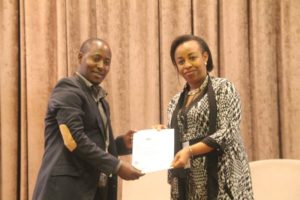
Katamba being handed a certificate of participation at the forum
Jaguza Livestock App is currently being used on 62 farms in two districts in Uganda to detect earlier, the diseases that attack livestock and hinder the quality of meat and quantity of milk produced.
It has won a number of local and global awards including locally organised ACIA Awards, e-agriculture category at the Commonwealth Youth ICT competition 2016, the ITU World Entrepreneurship Award in Budapest, Hungary among others.
In Rwanda, Katamba travelled with officials from the Uganda Communications Commission (UCC), the National Information Technology Authority (NITA) and other players in the ICT industry.
Does Your Firm Keep Track Of Livestock?
Does your farm struggle to keep track of its livestock? Have you ever wondered how you can increase your average daily gain with an accurate and secure livestock identification system? Do you want to improve your livestock tracking capabilities without increasing overhead?
With Jaguza you are able to easily record livestock identification information by entering animals directly into the software right as they are born out in the fields! Through the use of our livestock identification software, you can better manage your herds and flocks, gain anytime, anywhere access to all your livestock ID tags, track animals from birth to processing or relocation, and improve consumer trust with transparent traceability.
Our livestock identification system keeps your data safe and secure without the hassle of constant updates and maintenance. Let us handle the IT side of things so you can focus on what matters most” managing your animals in a way that brings you superior products, an increase in estimated breeding value, increased profit and successful transitions to the next generation of your herd or flock.
Livestock Information
We provide absolutely free livestock information to the community, it’s that simple. But why are we doing it for free? With focus on helping the community, we monitor and follow up on all the cases handled by various farmers from our expert. With the assistance of professional Vet Doctors, livestock farmers can easily acquire the best farming advice and assistance anytime anywhere. At JAGUZA we believe that some questions can be answered and directions can be given so easily.
How can the world nourish 9.8 billion people by 2050 through sustainable practices?
Food systems do not currently provide nutritious food in an environmentally sustainable way to the world’s population.
Nearly 800 million people are undernourished while 1.2 billion are overweight or obese. At the same time, food production, transportation, processing and waste are putting unsustainable strain on environmental resources.
Through the experience of ICT developers and innovators, the #JaguzaLivestockApp has developed a new model for livestock management, and reduction in production cost in agriculture and farming at large.
This model/system is already being used globally with practitioners and farmers as an effective application in line with the approaches in agriculture and also a contribution to the UN Sustainable Development Goals.
A visionary: Ronald Katamba strengthening IoT, soft skilling base in Uganda
One day in 2011, Ronald Katamba went to office to alert his employer that he was quitting his 9 to 5 job. Katamba had been working with Techno Brain’s Ugandan branch, earning an annual salary of about Shs60 million.
Mankind, for several years, has been making decisions basing on mainly experience and advice; Katamba is no exception.
A few years earlier, Katamba, then a student of Information Technology at Makerere University, had participated in the Imagine Cup, an annual Microsoft Corp-organized competition that brings together student developers worldwide to help resolve some of the world’s toughest challenges.
While there, he met the developer of Microsoft Visual Studio, who told him to focus on building his own startup instead of working for other companies. He took the advice. Though he later accepted a job after college, Katamba wanted to save some initial capital to kick off with. It was that day of 2012 that he felt time was ripe. (I was not able to independently verify the salary claim.)
On an afternoon of June 13, I hailed a SafeBoda for a ride to Teacher’s House located along Bombo Road in Kampala. Afrosoft IT Solutions, Katamba’s startup, occupies the largest part of the facility’s second floor. Having been inspired by a Microsoft worker, Katamba replaced Micro- to create Afro-soft.
While he now rents two spacious adjacent rooms that shelter equipment through which hundreds of youths have acquired multiple entrepreneurial and IT skills, 7 years ago he was occupying a tellingly smaller section in one of the rooms, acting both as his office and bedroom.
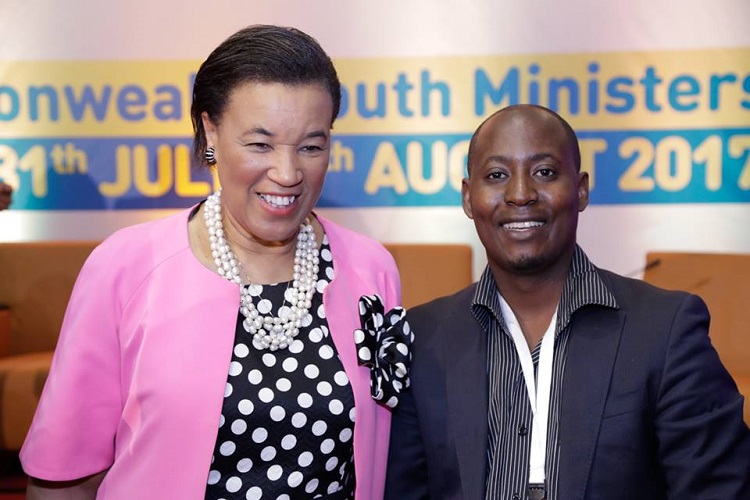
Commonwealth Secretary General Patricia Janet Scotland poses for a photo with Ronald Katamba during the Commonwealth Youth Ministers meeting in July of 2017 in Uganda
“My friends and I used to work and sleep here,” Katamba, wearing a triumphant smile recollected the period, adding: “my mattresses are still there we can go and I show them to you (I forgot to remind him after the interview).”
Afrosoft IT Solutions has developed applications and several other tools that have been used to support rural health facilities and agriculture organizations. Some of the organizations that have gained from his works include Has Children Hospital, Kisakye Heath Center, Esaff Uganda, Uganda Oil Seed Producer and Processor Association (UOSPA).
Among the key produts of his startup is Jaguza Livestock App, a software built to monitor and diagnose early stages of diseases in animals, using sensor technology, and locate the whereabouts of animals in a given area using GPS, or Global Positioning System trackers.
The inspiration to develop this tool was drawn from excruciating memories in the late nineties. After losing his parents at an early age, Katamba resorted to rabbit keeping to raise school fees. The project was however short-lived when he woke up one day and found all of them dead.
“That is exactly what inspired me to build the app because I know there is someone out there who is like me, and they need help,” he has said in previous interviews.
Before Jaguza, Katamba had developed Lunda, a mobile application that would follow up the gestation period and insemination of livestock. It was after attending a UN Youth Innovation Hangout that he decided to make a more inclusive and sophisticated software.
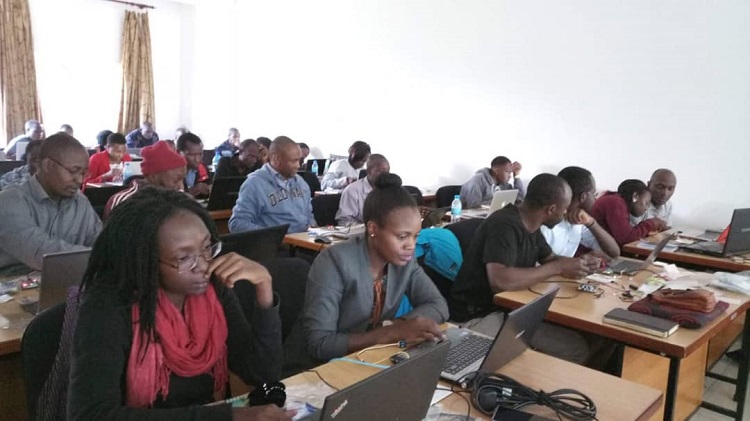
Ronald Katamba (in grey shirt) at Tanzania at Nelson Mandela institute of science and Technology
The app can be used online and offline. While online, the notifications are received via the app although there is an SMS option for offline users.
The application is currently operational in 3 districts in eastern Uganda; over 60 veterinary doctors can be accessed via the app that has assisted more than 800 farmers.
IoT and soft skilling
Ronald Katamba has travelled to several places across the globe and participated in regional, continental and global technology events. And one crucial aspect he has observed from all this, is that Africa still lags behind in IT skills.
It is against this background that he has decided to, through his company, avail an opportunity for young people to acquire soft skills in entrepreneurship and emerging technologies like the Internet of Things, or IoT.
Africa has one of the fastest growing youth populations, and by 2050, the population is expected to double to over 830 million. Uganda is said to have the world’s youngest population with over 78 percent of its population below the age of 30.
According to Africa Development Bank, the potential benefits of these youths have not been realized because most of them are unemployed, discouraged, or only vulnerably employed.
However, AfDB also notes that, with the world at the brink of a fourth industrial revolution, the demand for digitization across all sectors has never been greater, and, officials feel, these youth hold great potential to lead this digital revolution.
To partake in this advancement, though, youths need to acquire the skills and experiences needed to access the full range of available employment and entrepreneurship opportunities in the ICT sector.
Afrosoft IT Solutions is among the startups that are taking the lead in Africa.
Afrosoft currently hosts over 300 students from a variety of tertiary institutions on internship program and they are being offered soft skills like communication techniques, grooming, work ethic and time management. the interns are also walked through basic coding and programming.
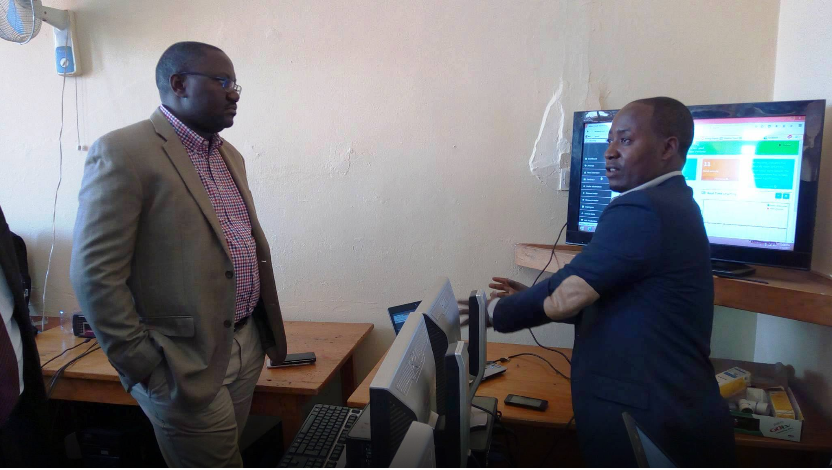
ICT Ministry Permanent Secretary at Afrosoft offices. At the right, Katamba makes a presentation.
During holidays, secondary school students and pupils are also admitted to the facility for elementary training in computer applications and manipulating hardware like robots.
Katamba believes that when a child is trained at a young age, by the time they grow up, they have acquainted themselves with the ICT world and amassed a ton of knowledge to shape their career.
These services come at a fee, beginning at Shs 200,000 for those between 5 and 15, and then Shs350,000 for those at post-primary school level.
Katamba told me that learners are given ample time to manipulate the machines. Interns are also taken to places where Afrosoft has contracts in order to expose them to work.
Aside from the above, Afrosoft is trying to strengthen the base for training Ugandans in the Internet of Things.
IoT is a network of physical devices, vehicles, home appliances and other items embedded with electronics, software, sensors, actuators, and connectivity which enable these objects to connect and exchange data.
The IoT provides for more integration of the physical world into computer-based systems, which in turn results in improved efficiency, accuracy and economic benefit while reducing human intervention.
For perspective, imagine a world where you have an application on your phone that you can universally use to command doors on your house, refrigerators, electric lights, TV screens, cars and anything electronic usable by mankind.
IoT is among the technologies that are being endorsed as the world advances to smart homes and cities. It’s training, especially in developing countries is still wanting.
Charles Kalungi is the IoT instructor at Afrosoft. Kalungi, who projects a predictable nerdy figure – slouched posture and shy – told me that he taught himself most of the technology concepts.
He has a Bachelor of Software Engineering from Makerere University. Besides using the Internet to acquire knowledge in IoT, Kalungi also learnt some ideas from a friend who was more schooled in it. Kalungi says at Makerere, they were just introduced to it (IoT), but there was no hands-on experience, apart from using simulators.
Kalungi says rudimentary application of IoT has been around though people had not realized that; he justifies that with cases like using scanners to open doors and fingerprints to lock houses. The only difference now, he says, the system will be internet based.
In his short experience with IoT, Kalungi has participated in development of some innovations like ‘Motokayo’, an instrument that integrates car devices, and another is used to connect home appliances (he has tested it but he hasn’t exploited it commercially).
Charles Kalungi has so far conducted 3 internship programs at Afrosoft and trained hundreds of students both within and outside Uganda.
As such technologies are embraced, apart from lack of skills, there are other challenges like internet penetration, currently at 49%, that we face as a country. Government, however, say it is taking several steps to solve some of the challenges, and this year the ICT budget was increased by Shs43 billion. But this is much lower compared to our neighbor Kenya.
Ronald Katamba looks at IoT as a technology that “will speed up our lives and ease the way we do business.” He has already integrated IoT in Jaguza, and, using a feature called Animal Mapping, he is able “track the movements of my cows.”
Another system that has been developed though currently caged is Makotoba, which can be used to diagnose tuberculosis using a phone. They have previously approached some organizations for collaboration but some, instead of supporting them, launched a competition against it.
On a good note, they were able to secure a patent with support from the Ministry of Science, Technology and Innovation.
Funding
Just as any other startup, Afrosoft is still grappling with limited facilitation. For most of these years, Katamba has been mainly supported by an individual he never wants to disclose but likes to praise.
Another key sponsor has been Microsoft, which, as he began, gave him a package where he would download software free of charge.
In March of this year, the Microsoft Corporation named him the IoT evangelist for East Africa and promised him funding, including access to Azure cloud services.
Azure is a cloud computing service created by Microsoft for building, testing, deploying, and managing applications and services through a global network of Microsoft-managed data centers.
He has so far been to several East African region institutions, including Nelson Mandela Institute of Science and Technology in Tanzania, Kabarak university in Kenya and FabLab in Namibia, spreading the IoT gospel. In Uganda, he has organised hackathons in Muteesa I Royal University, Kampala International University and Islamic University in Uganda.
On a sad note though, Katamba has not received significant support from his own government, despite having met President Yoweri Museveni, Speaker Rebecca Kadaga and a call from the ICT ministry.
Despite the delayed promises, Katamba is still hopeful; he has even turned down multiple offers from prominent organizations, including a job in Silicon Valley, just to stay around and support the development of ICT in his country.
The Government of Uganda has set aside Shs75bn to support ICT innovators under a five-year National ICT Initiatives Support Programme in the country.
In the first phase, Shs15 billion was released, with Shs5bn channeled to the establishment of the state-of-the-art National ICT Innovation Hub at the Institute of ICT, Nakawa, and the remaining portion was doled out to 12 innovators in April of this year, who were selected by a 9-member committee.
There is talk, however, that the process of selection is not fair, and some people are said to be benefiting because of technical know who.
For now, Katamba says a USD100,000 support from government would help him create a strong base. He believes he can train developers, a thing, he says, would help government to realize its goal of enhancing local content instead of outsourcing IT labor. Several systems to support government programs can be developed, he says.
At the Africa Innovation Summit which was recently hosted in Rwanda, Katamba, who was invited to speak about IoT, linked up with officials from African Development Bank, The Rockefeller Foundation, Microsoft and Facebook who, during that event, launched a program dubbed Coding for Employment.
The program is aimed at training youth in demand-driven Information and Communications Technology (ICT) curriculum and matching graduates directly with ICT employers in order shape them for tomorrow’s jobs. The program is expected to create over 9 million jobs and reach 32 million youth and women across Africa.
Studies are currently being carried out to see how to implement the program.
Testimony
One of the people that have benefited from Afrosoft is Jordan Mukisa, who while at Makerere University Business School, applied for an internship placement and has since remained at the company.
In our interview, Mukisa who was interrupted in the middle of a teaching session told me that “If it wasn’t for Afrosoft, I wouldn’t be doing what I do: training. The little computing (such as Word Press, Javascript, computerized accounting, report writing and documentation) I know, I learnt it from here.”
Mukisa studied Business Computing at MUBS.
Commonwealth ICT Forum Calls For Support For Apps Entrepreneurship
App developers, policymakers and regulators have gathered in Kigali to promote mobile app entrepreneurship as a means to accelerate the development of ICT applications in areas such as education, health and other sectors.
The Commonwealth ICT Applications Forum 2017, the first of its kind organised by the Commonwealth Telecommunications Organisation (CTO) and hosted by the ministry of youth and ICT, showcased the work of app entrepreneurs and discussed how policy and regulation can foster innovation.
“ICT applications offer enormous potential to enhance socio-economic development,” said Shola Taylor, secretary-general of the CTO. “We have assembled in Kigali to discuss how innovative ICT apps can assist communities, enhance national economic growth, expand national ICT industries and promote understanding between people and communities.”
Fuelled by the rise of smartphones, phablets and tablets, the global app industry is expected to be worth around $190 billion by 2020.
Speaking at the opening of the event on Wednesday, Jean Philbert Nsengimana, Minister of Youth and ICT outlined the potential for the app economy.
“The app economy means lives saved,” Nsengimana said. “Apps are saving lives, farmers are being empowered, education is being improved, governments are being made to be responsive and responsible.”
Also speaking at the opening ceremony, Andrew Rugege, Regional Director for Africa at the Telecommunication Development Bureau of the International Telecommunications Union, said the forum was an opportunity to ensure Africa isn’t left behind.
“The Commonwealth ICT Applications Forum 2017 is one of the gateways and opportunities for us to ensure that Africa does not once again get left behind in the Fourth Industrial Revolution,” he remarked.
The ICT Applications Forum featured an interactive session to identify apps that can address needs and discussed how policymakers can cultivate a vibrant app economy. The event also showcased inspiring ICT entrepreneurs, such as: Ronald Katamba, Jaguza Livestock App, Uganda; Dr Agbor Ashu, GiftedMom, Cameroon; Jean Niyotwagira, Torque Ltd, Rwanda; Shikama Dioscore, Agrigo Ltd, Rwanda ; Richard Migambi, Evolve Ltd, Rwanda; Mariam Muganga, Academic Bridge, Rwanda
The event, which is also supported by the Rwandan Utilities Regulatory Authority (RURA), is part of a wider effort by the CTO and member countries to promote the use of ICT applications for socio-economic development in areas such as e-governance, e-health, e-education and e-agriculture.
He Reared Rabbits For Fees And Now Designs Apps To Detect Diseases
A former rabbit keeper has made it his mission to help farmers in detecting the early stages of diseases in animals as more people strive to ease some of the most pressing problems associated with commercialised agriculture.
Ronald Katamba and his colleagues; Martin Ojambo, Alvin Kabwama and Kyenune of Afrosoft, a company located at Teacher’s House on Bombo Road, have touched many farmers with their Jaguza Livestock software application.
Jaguza is a software that can detect diseases in animals days before they actually manifest openly. It is being used as a pilot project on four local farms, where animals are marked with an identification number, then a device attached to them which can be seen and monitored using a mobile phone or a computer.
At 12 years of age, Katamba, was a rabbit farmer in Kayunga, a community where people dedicated lots of their efforts and resources in animal keeping. This helped him pay school fees until one day in his Senior Two (2000) at BLK Muwonge SS, when he woke up to find all his rabbits dead.
“It’s this inspiration I got when I was a child that I wish to extend the resilience and effort in caring for the livestock in Uganda and the entire region,” Katamba, who lived with his grandfather John Mukiibi after losing his parents, narrates.
“Having lost all my rabbits in one day and missing school for the whole of my second term, I want to help other people like me who continue to fail to detect disease in animals,” he adds.
A scientist’s dream
Losing his source of livelihood, it could be argued, was a blessing in disguise. His uncle Mwesigwa Ssemambo, an Information Technology (IT) technical consultant, introduced him to programming, gave him books so he could learn how to write codes in C, a computer programming language. Katamba’s dream to become a computer scientist was enhanced when he was teaching computers to students at Entebbe Municipal Council during his Senior Six vacation.
Katamba also caddied at Entebbe Golf Course where he met an Indian, LK Ladia, who got him a scholarship to join Makerere University for a short course in Cisco in 2005.
“I had to ensure I certify and then went on to do a Bachelors in IT, where I started writing short programmes. I had no personal computer so I had to sleep in the computer lab to practice and read,” he adds. In 2008 at campus second year, he participated in the Microsoft Imagine Cup, a competition where students come up with innovative solutions basing on the UN millennium development goals.
“Ours was on Land use. We (Makerere) managed to beat 14-16 African countries and represented East and Southern Africa in the finals in France,” he shares. In 2010, Katamba became a teaching assistant at Makerere but left two years later to start his own company.
Selling the Jaguza gospel
While at Makerere, Katamba supervised and recommended many students’ works including Win Senga’s Mati Babu, a software for diagnosing malaria.
He helped supervise Joshua Waburo’s Makotoba, an app that helps diagnose tuberculosis. Waburo was later invited for an innovators camp in Silicon Valley for six weeks.
“I designed Lunda, a mobile app that helps to follow up the gestation period and insemination of livestock, after he attended a UN Youth Innovation Hangout last year,” Katamba explains.
“It made me think I should make an app detecting diseases in animals and that was the birth of Jaguza in May last year.”
UN Resident coordinator Ahunna Eziakonwa liked Jaguza and advised Katamba to present it at the ITU Telecom World awards held October 12-15, an event that would attract participants from 129 countries.
Before then, he shared his ideas at the ACIA awards held at Sheraton Hotel, and at a platform held by Vodafone at Kampala Serena Hotel from where he was encouraged by positive reactions from farmers.
“After that, Mr (Godfery) Mutabazi ensured I applied for the ITU awards.
“Mr Mutabazi told me people were eager to see my project but there was no one at my stall. The judges found it fitting to select me for the Best Project category,” he continues.
Challenges
Katamba and his colleagues leave in constant fear their work could be plagiarised.
“When people call me, I tend to think they want to help me but sometimes people take our ideas and create their own apps.
The app also has a few limitations. “To monitor gestation, you have to note changes in animals that will be giving birth for the very first time, to know if they are pregnant.
After that, you can always monitor the gestation and insemination periods of the animal using Jaguza.”
Also, the farms we have visited are in villages with poor network. We need to partner with telecom companies so we can use their boosters,” Katamba reveals.
How the app works
Jaguza Livestock App is a system used to monitor and diagnose early stages of diseases in animals, using sensor technology, and locate the whereabouts of animals among others. It can locate the whereabouts of the animals in a given geographical area. Each time an animal moves out of range, a notification is sent to a solar powered receiver (spr) from the device. The spr sends this information to a cloud server which in turn sends information to your computer or mobile phone.

